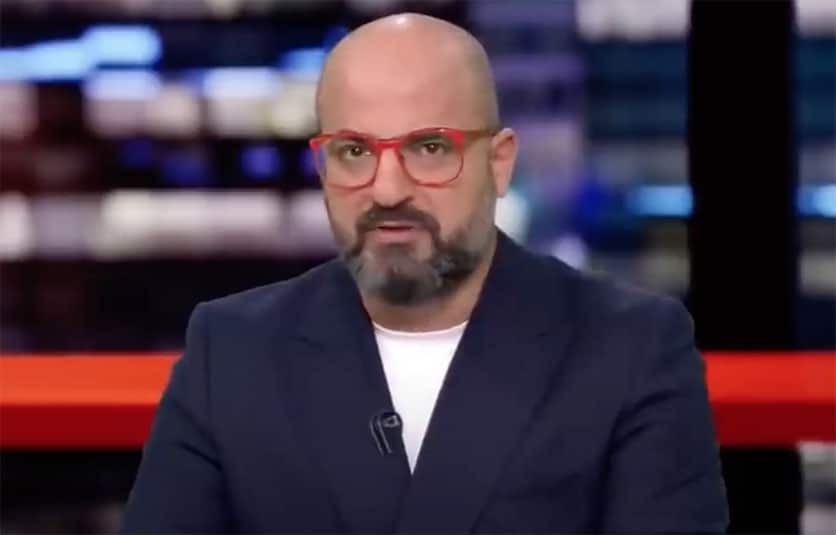 Screenshot from YouTube
Screenshot from YouTube Shi’ite Lebanese journalist Nadim Koteich wrote a recent op-ed calling for the Lebanese people to free themselves of Hezbollah and forge a peace agreement with Israel.
According to a November 2 MEMRI [Middle East Media Research Institute] report, Koteich, writing in the London outlet Al-Sharq Al-Awsa, noted that the Lebanese media and politicians are currently investigating whether gas delivered to Lebanon via Egypt and Jordan was “contamine” with Israeli molecules. Koteich called it “militaristic nonsense,” as Lebanon is currently in a “severe and perpetual crisis, which is deteriorating by every realistic standard.”
“Why does Lebanon need to bring in gas by this circuitous route, from Al-‘Arish in Egypt through Jordan and Syria, when, as a country on the Mediterranean, it could immediately start drilling and tapping its [own] gas [fields], adjacent to the Israeli ones?” he asked. “Alternatively, it could reach practical understandings with Israel and discuss joint energy projects with it, like the ones Israel has with Egypt, Cyprus, and Greece, or at least reach internationally-brokered understandings [with Israel] about dividing the natural resources in accordance with international law. Why do we not hear Nicosia or Athens complaining about ‘Israeli greed’ with respect to their natural resources, or at least not to the extent that we hear this in Lebanon?”
Koteich proceeded to accuse Hezbollah of perpetuating a “conflict first” mentality with Israel. “Lebanon insists on ignoring the fact that the most conspicuous wave of changes in the Middle East is the recent wave of peace [with Israel], which was spearheaded by the [United Arab Emirates] and joined by the kingdoms of Bahrain and Morocco and by Sudan, and which was welcomed [even] by Arab capitals that did not join the peace [agreements],” he wrote. “Thanks to this peace, Morocco made a series of important [achievements involving] recognition of its sovereignty over the Sahara … Thanks to this peace, a strategic economic conference was held on Sudan, following which many of its debts were forgiven and an economic roadmap was drawn for [the country]… As a result it has started to recover and is becoming one of the most promising countries in Africa, according to reports by the World Bank.”
The journalist also noted that Lebanon is no longer under Israeli occupation and Israel has no interest in annexing the country; the Israel-Lebanon dispute is merely “technical” regarding territorial ownership. He concluded his piece by calling a potential Israel-Lebanon peace agreement “one of the most reasonable moves in the overall context of Israeli-Arab relations.” “What no Lebanese must accept is that Lebanon is being prevented from [utilizing all its] options, with the aim of perpetuating the weapons of the Hizbullah militia and the factors that enable it to justify itself. It is unacceptable to keep Lebanon hostage to the Hizbullah militia’s narrative on the conflict with Israel, and to preoccupy the Lebanese with divining the ‘identity’ of each molecule of gas they beg [from other countries], while the Lebanese gas [still buried] in the Mediterranean is slowly being dropped from the gas equations in the Middle East.”
Jewish groups praised Koteich’s op-ed. The Simon Wiesenthal Center called Koteich “a voice of reason from Lebanon where the Lebanese people continue to suffer under the yoke of Iran lackey #Hezbollah as it careens towards horrific war with Israel.”
A voice of reason from Lebanon where the Lebanese people continue to suffer under the yoke of Iran lackey #Hezbollah as it careens towards horrific war with Israel. #MEMRI https://t.co/YFmW9I2BlO
— SimonWiesenthalCntr (@simonwiesenthal) November 2, 2021
StandWithUs similarly tweeted that Koteich is “an important voice sharing an important message of peace. We look forward to the day when peace between #Israel and #Lebanon will be actualized.”
An important voice sharing an important message of peace.
We look forward to the day when peace between #Israel and #Lebanon will be actualized. 🙏https://t.co/1hiKtazFZu
— StandWithUs (@StandWithUs) November 4, 2021
MEMRI noted that Koteich has also called for peace between Israel and Lebanon in a 2020 article and accused Hezbollah of being the main obstacle to peace.























 More news and opinions than at a Shabbat dinner, right in your inbox.
More news and opinions than at a Shabbat dinner, right in your inbox.